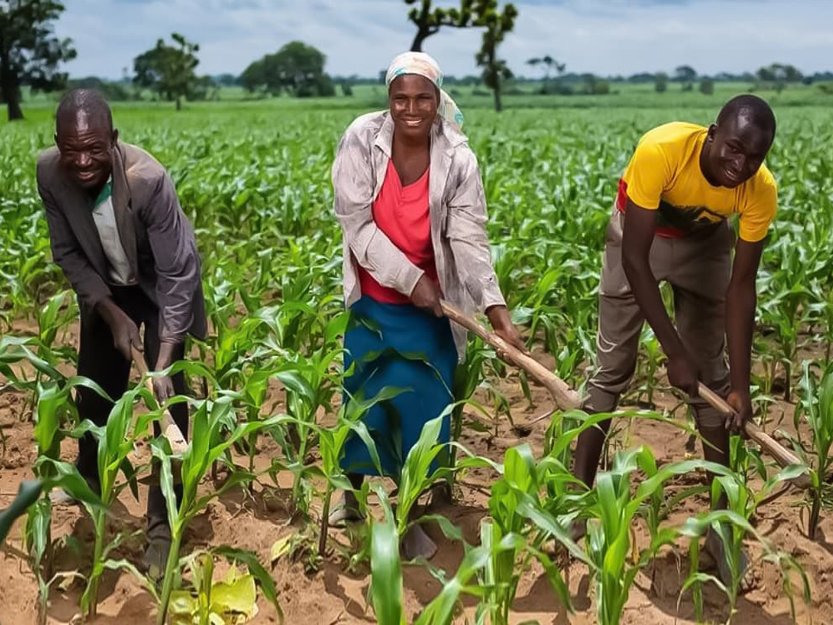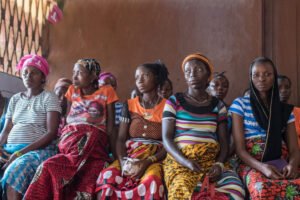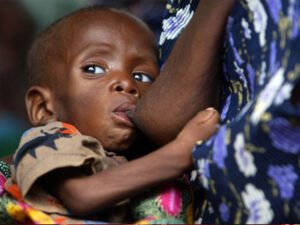Overview of the Project
In rural Uganda, the majority of families rely on agriculture for their livelihoods. However, many smallholder farmers face challenges such as poor soil, unpredictable weather, and limited access to modern farming techniques and tools. These challenges lead to low crop yields, food insecurity, and poverty, leaving families vulnerable to malnutrition and economic hardship.
Our Agricultural Training & Food Security Projects aim to address these issues by providing farmers with the knowledge, tools, and resources they need to improve their agricultural practices. We offer training in sustainable farming techniques, crop diversification, and animal husbandry, helping farmers boost their yields, improve their nutrition, and generate income. By empowering communities to grow their own food sustainably, we are helping them build a future free from hunger and poverty.
Key Focus Areas of the Project
- Sustainable Farming Techniques:
We provide training in sustainable and climate-resilient farming methods, including crop rotation, organic farming, and soil fertility management. These techniques improve soil health and increase crop yields, ensuring that farmers can feed their families and sell surplus produce for income. - Livestock & Animal Husbandry:
In addition to crop farming, we support livestock farming, teaching families how to raise chickens, goats, and cattle. Livestock not only provides a source of nutrition (meat, milk, and eggs) but also serves as an economic asset, allowing families to sell livestock products for additional income. - Irrigation & Water Conservation:
Unpredictable rainfall and droughts are significant challenges for farmers. We teach water conservation techniques, such as rainwater harvesting and small-scale irrigation, ensuring that farmers have access to water for their crops even during dry seasons. - Seed Distribution & Crop Diversification:
We distribute high-quality seeds to farmers and encourage crop diversification, which helps improve nutrition and reduce dependency on a single crop. Growing a variety of crops also makes farming more resilient to pests, diseases, and market fluctuations.
The Importance of Food Security
Food security is the foundation of a healthy, thriving community. Here’s why it matters:
- Improved Health & Nutrition: Families who grow their own food have better access to a diverse range of nutritious foods, reducing malnutrition and improving overall health, particularly for children.
- Economic Stability: Farming allows families to produce food for themselves and sell surplus produce in local markets, creating a source of income that helps pay for healthcare, education, and other essentials.
- Resilience to Climate Change: With training in sustainable farming techniques, farmers can adapt to climate change by using methods that conserve water, protect the soil, and make crops more resilient to extreme weather.
- Breaking the Cycle of Poverty: By equipping farmers with the skills and resources to succeed, we help them break free from the cycle of poverty and build a more stable future for their families and communities.
The Impact of Our Agricultural Training Programs
Our agricultural training and food security initiatives have brought about significant positive change in the communities we serve:
- Increased Crop Yields: With better farming techniques, farmers are seeing improved yields, which means they can feed their families and generate income from the surplus.
- Improved Nutrition: Families have access to a more diverse range of crops, leading to better nutrition and health, especially for children and pregnant women.
- Sustainable Livelihoods: By learning skills in livestock management and crop diversification, farmers are not only improving their own food security but also creating sustainable livelihoods that provide economic independence.
- Empowered Women & Youth: Many of our programs specifically target women and young people, helping them gain farming skills and contribute to their family’s income. This leads to greater gender equality and more opportunities for youth in rural areas.
The Need for Your Support
While we’ve made progress, there is still much to be done. Many farmers in rural Uganda still lack access to the training, tools, and resources they need to succeed. Your donation can help us provide these essential services, empowering farmers to grow more food, support their families, and improve their communities.
- $50 can provide a family with seeds and tools to start a home garden.
- $100 can sponsor a farmer’s training in sustainable agriculture, improving their yields and food security.
- $500 can fund a water conservation system for a farming community, ensuring crops survive during dry seasons.
- $1,000+ can help establish a community farming cooperative, providing farmers with shared resources and a support network.
Why Your Support Matters
- Ending Hunger: Your donation directly helps families grow their own food, reducing hunger and malnutrition in some of the most vulnerable communities.
- Sustainable Change: Rather than providing short-term aid, you are contributing to long-term solutions that empower farmers to become self-reliant and build sustainable futures.
- Community Transformation: By supporting agricultural training, you help entire communities thrive as they gain the skills and resources to grow food, earn income, and support their families.
How You Can Help
Your involvement in our Agricultural Training & Food Security Projects will create lasting, positive change for farming families in Uganda. Here’s how you can support this vital initiative:
- Donate Now: Your contribution will fund training programs, provide seeds and tools, and support sustainable agriculture efforts that improve food security for vulnerable communities.
- Sponsor a Farmer: You can sponsor a farmer’s training in sustainable agriculture, providing them with the skills and resources to build a successful farm and support their family.
- Volunteer: Share your agricultural expertise by volunteering with us to train farmers and help implement sustainable farming practices.
Together, We Can Ensure Food Security for Families
By supporting our Agricultural Training & Food Security Projects, you are helping to end hunger, improve nutrition, and empower communities to grow their own food sustainably. Join us in cultivating a brighter, more food-secure future.








